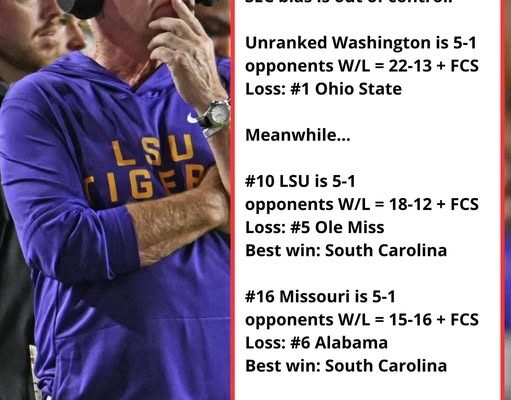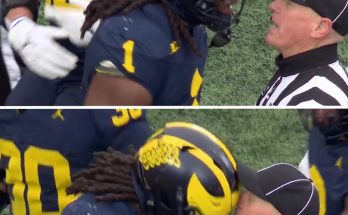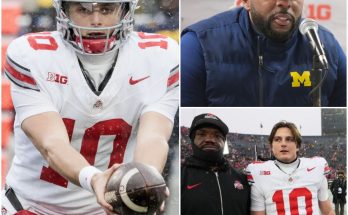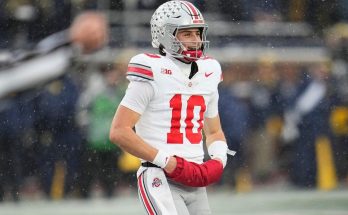College football’s weekly rankings have long been a breeding ground for debate, and this week, the tension is once again palpable. The controversy centers around two programs that couldn’t be on more different trajectories — Washington and LSU. Both are winning, both are talented, and both have star coaches and elite quarterbacks. Yet, somehow, only one of them seems to be getting the respect that matches its résumé.
Let’s start with the simple question that has set off countless arguments in locker rooms, living rooms, and press boxes across the country: Why is LSU ranked higher than Washington when Washington has beaten real teams, and LSU has not?
It’s the classic case of perception versus performance, and this time, the numbers, the matchups, and even the game film tell a story the polls seem unwilling to hear. Washington has been quietly taking down legitimate competition week after week, stacking wins over ranked opponents, and doing so with a brand of football that’s physical, disciplined, and complete. LSU, on the other hand, has leaned heavily on reputation and preseason expectations, carving out victories over lesser teams while struggling to prove itself against the nation’s elite.
Yet, here we are again — with LSU sitting comfortably in the top ten and Washington fighting for national acknowledgment.
The situation has left many fans and analysts asking the same question: what are the rankings really measuring — performance on the field, or the logo on the helmet?
Washington’s season has been nothing short of methodical. Head coach Kalen DeBoer’s team has displayed the balance every contender dreams of. Their defense, once a concern, has matured into a unit that thrives on pressure and disciplined pursuit. Their offense, led by a confident quarterback and a deep receiving corps, has been both efficient and explosive. Most importantly, they’ve done this against teams with real credentials — conference rivals, ranked squads, and defensive units that don’t roll over easily.
In contrast, LSU’s schedule has been softer than the rankings would suggest. The Tigers have put up impressive point totals, yes, but when you peel back the layers, the opponents tell the real story. Blowouts over unranked teams with losing records inflate their stats, while their few games against quality opponents reveal cracks that numbers alone can’t hide.
Still, when the new rankings hit the airwaves, LSU climbed — again. And Washington? A modest bump, barely enough to turn heads.
To understand why this is happening, one has to look beyond the field and into the way college football culture interprets success. LSU, a powerhouse with recent national championship pedigree, benefits from what can only be called institutional memory. Poll voters remember Joe Burrow’s run, the roar of Tiger Stadium, and the SEC mystique that has defined the college football hierarchy for decades. Washington, meanwhile, fights against a different narrative — one that paints the Pac-12 (or what remains of it) as less competitive, less physical, and ultimately, less important.
That bias — conscious or not — creeps into the rankings every single year.
But the irony is striking. The same Washington team being overlooked is the same program that continues to win against proven competition. They’ve faced multiple teams with top-25 credentials and walked away victorious. They’ve done it without the benefit of a media machine that turns every win into a national headline. LSU, meanwhile, enjoys a built-in hype cycle, fueled by SEC coverage dominance and historical prestige.
Look deeper, though, and the gap becomes undeniable.
Washington’s average opponent win percentage is far higher than LSU’s. Their point differential against ranked opponents is impressive. Their defensive efficiency is better. They’ve played in tighter games, in louder environments, and have emerged composed and resilient each time.
LSU’s offense, as dynamic as it is, has yet to be truly tested by a defense of Washington’s caliber. Their secondary has given up explosive plays, their line has shown inconsistency in protection, and their discipline has faltered in key moments. Against real competition, these flaws are exposed — yet the narrative persists that the Tigers are “one of the most complete teams in the country.”
That’s the danger of perception: it can shape reality before results have a chance to catch up.
When you look at the trajectory of both programs, it’s almost poetic. Washington has become the model of quiet dominance — no flash, no scandal, just relentless preparation and execution. They don’t need headlines to justify their place; their performance speaks for itself. LSU, conversely, thrives in the spotlight, feeding off the buzz and the bravado of being an SEC blueblood.
But if we’re judging teams on who they’ve beaten and how they’ve played, Washington’s case isn’t just stronger — it’s irrefutable.
Take last week, for example. Washington’s defense shut down a top-15 offense that had averaged over 40 points a game. Their offense executed with surgical precision, controlling the tempo and capitalizing on every mistake. That kind of win isn’t luck — it’s validation. LSU’s corresponding victory came against a 3-3 opponent whose defense ranked near the bottom of its conference. And yet, in the polls, Washington moved up one spot. LSU stayed steady.
It’s moments like that when fans begin to lose faith in the process.
The college football ranking system, both in the AP Poll and the Coaches Poll, has always been as much art as science. Voters bring biases, narratives, and memories into the mix — and while it’s part of what makes the sport emotional and subjective, it’s also what makes it maddening. The problem isn’t just that Washington is underrated; it’s that the logic behind their placement doesn’t hold up under scrutiny.
This is not to say LSU isn’t a good team. They are — stacked with athletes, coached by a proven leader, and dangerous on any given Saturday. But being “good” and being “proven” are not the same thing. Washington has proven itself week after week. LSU has merely asserted that it belongs — and so far, voters have believed them.
One might argue that strength of schedule will eventually even out, that as the season progresses, both teams will have to face tougher opponents. That may be true, but rankings are not just predictions — they’re reflections of what teams have done up to this point. And what Washington has done deserves far more recognition than a secondary mention below programs with flashier resumes but thinner proof.
It’s a recurring pattern in college football: a West Coast team dominates real competition but gets buried beneath the glitz of the SEC. The media narrative shapes national perception, the fans follow suit, and by the time playoff conversations begin, the gap between reality and reputation becomes almost impossible to close.
Still, there’s a quiet confidence in the Huskies’ camp. They know what they’ve built, and they don’t need validation from polls to prove their worth. What they crave — and what they’re earning — is respect from those who actually play the game. Coaches and players across the country know the truth: Washington is a complete team, a disciplined one, and one capable of beating anyone on any field.



